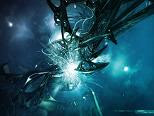Left to drown at birth and rescued by the kindly fisherman, Spyros (Pete Postlethwaite), Perseus grows to manhood unaware that he is a son of Zeus (Liam Neeson), king of the gods. When the death of his adopted parents at the hand of Hades (Ralph Fiennes) draws him into the clash between gods and mortals, Perseus arrives as a lowly fisherman in the kingdom of Argos. There, the boast of the foolish queen, Cassiopeia (Polly Walker), invokes the wrath of Zeus, who permits a vengeful Hades to destroy Argos by unleashing the Kraken, a malevolent beast spawned from the flesh of the Underworld. Lest the princess Andromeda (Alexa Davalos) be sacrificed to appease the gods, Perseus joins the quest to destroy the Kraken and stop Hades from usurping the throne of Olympus.
While original films age like fine wines, it is no phenomenon that gaudy remakes of classic blockbuster hits go stale within a week of their release. The notion that every century must revamp the art of another is often unfounded if not disastrous. Of course, there have been exceptions, like Zack Snyder's 300, adapted from the 1962 epic, The 300 Spartans, and Guess Who, starring Ashton Kutcher and the late Bernie Mac in a unique spin on the 1967 drama, Guess Who's Coming to Dinner. Clothe the Venus de Milo in Versace and the David in Gambana, however, and chances are there will be a slew of fans protesting the obstruction of bare originality.
Take for example the 1998 remake of Psycho, starring Anne Heche in place of Janet Leigh in the notorious "shower scene," and Vince Vaughn as Norman Bates. The film earned a Golden Raspberry for director Gus van Stans, a giant leap of the wrong kind from the Academy Award-nomination for the 1997 drama, Good Will Hunting. (Van Stans learned his lesson. In 2000, he directed Sean Connery and Rob Brown in the coming-of-age drama, Finding Forrester, which Richard Roeper praised as one of the ten best films of the year).
While director Louis Letterier may not expect any Razzies for this fifth installment to his repertoire, the nephews of Sam Worthington will be left wanting (Worthington dedicated the film to them as a Clash "for their generation.") Contrary to popular consensus, the film's dialogue is far from a primary flaw. At a run-time of 118 minutes, the same as the original film, the remake fails to utilize the plot to the same extent. A lengthy introduction to the hero and a skirmish with artificial scorpions oozing green goop steal from pivotal scenes, like the showdown with the Kraken (who pops up near the end of the film like a giant hemorrhoid in CGI).
Additional boos for bad acting are hardly credible when a majority of the cast appear as holograms decked out in glitter and do little or no acting at all. Here is the greatest contrast from the original film, whose success lay in part with the supporting roles of Maggie Smith (Thetis), Susan Fleetwood (Athena), Claire Bloom (Hera), and Jack Gwillim (Poseidon). Liam Neeson and Ralph Fiennes make a worthy duo as Zeus and Hades (with Neeson reviving the role originally played by Laurence Olivier). Kudos to Sam Worthington for the expressive portrayal of Perseus (surpassing Harry Hamlin by a milestone) and a deep nod to Gemma Arterton for the novel performance as Io. One star that ought to be complaining, however, is Alexa Davalos, whose talent is severely down-played in the role of Andromeda. In 2009, she starred beside Daniel Craig in the war drama, Defiance, showcasing a knack for theatrical presence and poise. While dangling from a cliff in her undergarments (sadly, the highlight of her small role in Clash), Davalos shows a great deal of poise, but is ill-used to the point of expense.
For Desmond Davis, director of the 1981 version, Clash was a one-hit wonder. Prior to being in the director's chair, he was a camera man whose work behind the lens included the Academy Award-nominated film, Freud (1962), and the Academy-Award winning film, Tom Jones (1963). While Letterier will go on to greater things in the comfort zone of Unleashed and The Incredible Hulk, Clash will remain in the shadows of a much bigger titan, an original that will not be surpassed by the enhancements of 21st century whims.



No comments:
Post a Comment